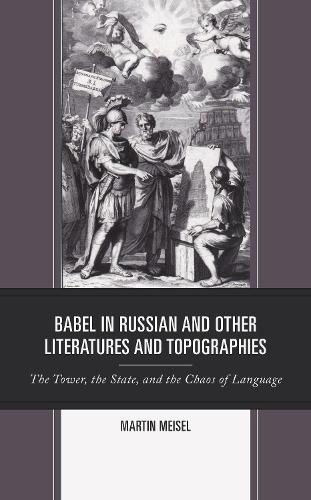
Babel in Russian and Other Literatures and Topographies: The Tower, the State, and the Chaos of Language
(Hardback)
Publishing Details
Babel in Russian and Other Literatures and Topographies: The Tower, the State, and the Chaos of Language
By (Author) Martin Meisel
Bloomsbury Publishing PLC
Lexington Books
15th August 2019
United States
Classifications
Professional and Scholarly
Non Fiction
History of other geographical groupings and regions or specific cultures / socie
891.709
Physical Properties
Hardback
168
Width 161mm, Height 227mm, Spine 17mm
445g
Description
This study analyzes the biblical Tower of Babel story, a cautionary tale that accounts for the diversity of languages and peoples, in Russian literature and other topographies. The author pursues its linking of language, architecture, and society as well as its relevance in art and literature over centuries. To come to terms with a perceived disorder in the realm of language, alternative explanations and projects for remediation abound. The disorder and diversity themselves find expression in art, literature, and philosophical reflection and caused the emergence of a historical linguistics. The ambition of the builderswith its social and organizational premisereemerges in both political and material form as cities, states, and monumental constructions. Utopian aspirations and linguistic claims permeate both revolutionary notions of universality and the romantic essentialism of the nation state. These in turn provoke dystopian critique in literature and film. As Martin Meisel reveals in this study, the wrestle with language in its recalcitrant instability and imperfect social function enters into dialogue with the celebration of its diversity, elasticity, and creativity.
Reviews
This is a lucid and erudite study of one of the defining myths of western culture. Martin Meisel is a superb guide through the broad and often contradictory implications of the Babel story, and its long history of adaptation and interpretation, culminating in its appearance as a great enabling trope in modernist literature. -- Stephen Orgel, Stanford University
As a follow-up to Chaos Imagined, Martin Meisel explores how language and chaos make and unmake each other. Babel is another coruscating contribution shot through with Meisel's sly humor and extraordinary erudition. -- R. Darren Gobert, Duke University
'Chaos is come again!' predicts Othello. Nothing daunted, Martin Meisel plunges directly into the linguistic and intellectual chaos figured by the Tower of Babel in order to make sense of it. Paradoxically, his account is eminently lucid, illuminated by flashes of wit and pyrotechnic displays of erudition. The breadth of coverage extends from drama to architecture, with an equally impressive range of reference. Cross-cultural, cross-disciplinary, this is a masterfully researched, exquisitely written exploration of one of cultures most slippery concepts. -- Laurence Senelick, Tufts University
This book reaches back into a Biblical pastBabel as origin of linguistic chaoswith a theoretical panache that illuminates the present. Because Meisel is supremely well versed in areas ranging from visual art and architecture to literature, theater and cinema, he can mine Shakespeare, Moliere, Bruegel, Joyce, Metropolis, and Blade Runner for gems of lucidity. From mutual incomprehension, Meisel findsor createsmeaning in a manner that is linguistically playful as well as philosophically profound. -- Annette Insdorf, Columbia University
Meisels book should be read by everyone who takes the study of language seriously. Against the background of the biblical story of the Tower of Babel, Meisel examines language as an instrument of order and of chaos at the same time.The authors remarkable erudition and analysis extend from Sumerian literature to Blade Runner, and much in between. -- David Sperling, Hebrew Union College
Meisel takes the biblical account of the divinely forestalled tower of Babel as his point of departure for a suggestive consideration of the resulting confusion of tongues as a figure for chaos itself. Drawing on a dazzling array of texts (religious, philosophical, political, narrative, lyric, dramatic, filmic), the author reveals the extent to which the fraught relationship between chaos and order, design and disarray, richness and ruin, energy and fixity has been framed in terms of languageas the rift between word and world, as the non-correspondence of word and word that results from the dispersal of peoples and the proliferation of cultures, the blighted prospects for understanding and cooperation (let alone the construction of towers), and the longing for recognizable equivalents. The upside to all this divergence and difference is the proposition that whats needed (and possible) is not uniformity but unity, less a matter of being the same than of being in contact. In Meisels learned discussion, what issues from that circumscribed report in Genesis is a cascade of hermeneutic possibilities that proceed from familiar melody to harmony to polyphony to a veritable canon of voices from centuries, genres, lands, and, aptly, languages. The result is a rich meditation on chaos that generates, associates, uncovers, and always, always illuminates. Reading it is a joy. -- Cathy Popkin, Columbia University
Author Bio
Martin Meisel is Brander Matthews Professor Emeritus of dramatic literature at Columbia University.
